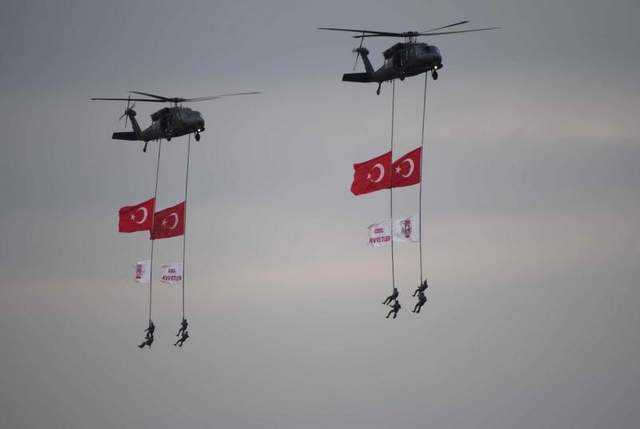A Turkish variant of the Sikorsky S-70 helicopter will be built under license by Turkish Aerospace Industries with a Turkish mission computer, avionics, landing gear and transmission. (Turkish Aerospace Industries)

ANKARA — In May, Turkey’s procurement office made an unusual announcement: Turkey “ had come very close to signing a $3.5 billion contract with Sikorsky Aircraft for the co-production of scores of utility helicopters.”
It also said that it had come to the final round of contract negotiations for the signing of the deal. Five months later, the contract still isn’t finalized.
Turkey’s top bureaucrat for defense procurement, Murad Bayar, blames US corporate and other bureaucracy for the delays. And one analyst said these problems will likely be taken into account the next time the US bids on a Turkish contract.
“We had to pause [in contract negotiations with Sikorsky] for a full month in August because of corporate bureaucracy,” said Bayar, head of the Undersecretariat for Defense Industries (SSM). “We lost a full month before we were able to iron out our differences.”
The talks have resumed and Bayar expects to finalize the contract this year.
“The problems have now disappeared. A fresh round of talks will begin Oct. 7-8,” Bayar said on Oct. 2. “We should be able to sign the contract later this year.”
Bayar complained of “immense US bureaucracy” that has delayed negotiations.
“The US Army insisted to review every piece of document Sikorsky would submit to us. That inevitably stalled the negotiation process for a contract which, in some cases, required document transfers on an hourly basis. Fortunately, we have overcome that problem,” Bayar explained.
Another reason for the delays, he said, was the size of the contract.
“This is a big and complex contract involving several Turkish companies as local subcontractors. What made matters extra difficult was the fact that there are seven different Turkish end-users,” Bayar said.
A representative from Sikorsky said the company and the SSM had “open dialogue and productive senior-level meetings in Ankara in October.”
“We feel confident that most open issues are resolved and we have a pathway to closure,” said Anand Stanley, Sikorsky’s vice president for the Middle East, Turkey and Africa. “[The program] is a win-win for Turkish end users and Turkish industry. We look forward to engaging our Turkish industry partners and commencing the program as soon as possible.”
As of Oct. 25, US Embassy officials in Ankara did not reply to requests for comment.
An industry analyst here said Bayar’s complaints may be reflected in future contracts for which US companies bid.
“SSM had a hard time dealing with the US bureaucracy, which they would not easily volunteer [to do] next time a US company contends for a big Turkish contract,” the analyst said.
Turkey in 2011 selected Sikorsky as its partner company to lead production of the country’s next-generation utility helicopters. Sikorsky defeated Italian-British AgustaWestland by bidding its T-70, the Turkish version of its S-70 Black Hawk International.
A contract has been pending since then, and industry sources said it was rumored that the delay was over major problems during contract negotiations. The first batch of the co-production program involved 109 machines.
The S-70 Black Hawk International is used by dozens of militaries, including Turkey. AgustaWestland was competing with its TUHP 149, the Turkish version of its newly developed A-149.
The first batch will be for 109 utility helicopters, but with follow-on orders, more than 600 platforms could be built at a cost of more than $20 billion, defense analysts said.
Sikorsky and AgustaWestland had announced benefit packages worth billions of dollars each. Several Turkish companies, most notably Turkish Aerospace Industries, will take part in the joint production.
Most helicopters in the first batch will go to the military, with the Gendarmerie receiving the largest portion, and the Army, Navy, Air Force and the special forces command each getting their share. The remaining helos will go to the Security Directorate, meaning the police forces, and to the Firefighting Department.
via Turkey Blames ‘US Bureaucracy’ For Delays in Utility Helo Deal | Defense News | defensenews.com.
